
This is everything they don’t want you knowing about nicotine

—-Important Message—-
This cheap supermarket supplement boosts men’s libido and load size
It costs less than 2 bucks at almost any grocery store…
And it starts working immediately, as soon as you take it…
It’s just a simple supermarket supplement that Big Pharma hopes you never find out about…
———-
Proof that nicotine can be good for you — shocking but true
Nicotine has been shown to enhance cognition, most specifically focused attention.
This is a real effect, and is highly consistent. While it’s true that people will often desperately grasp at straws in defense of those habits presumed as “bad” by others, the practice of smoking actually has good justification.
It’s been well-demonstrated that smokers have:
- Quicker reaction times
- Increased brain glucose rates
- More brain acetylcholine receptors
- Enhanced memory
- Decreased rates of Alzheimer’s disease
This is not just some flaky justification for smoking, but has been proven many times over.
Scientists now speak plainly about the cognitive enhancing effects of nicotine, an effect barely controversial at this point:
‘Evidence indicates in normal subjects that smoking and other means of nicotine delivery reliably enhance voluntary attention and attention-related cognitive performance in nicotine-deprived tobacco users.’ ―Parks
‘Nicotine clearly improves performance on a number of cognitive tasks in habitual tobacco users, as well as nonusers (Newhouse et al.).’ ―Parks
These effects of nicotine can certainly be seen as beneficial, yet ironically they are rarely used in defense of smoking these days (though they certainly SHOULD BE, if anything is).
Smoking can be seen as more defensible than, say… eating french fries, for instance:
The production of french fries involves:
- Taking a perfectly good potato
- Deep frying it in soybean oil
- Adding loads of salt to hide that stale PUFA taste
And this isn’t even a food preservation technique that’d gone habitual in time, such as sauerkraut production, yet one that is done simply for that nice crunchy-soft texture.
This process of course destroys all the vitamin C, many of the potatoes’ B-vitamins, inverts the Na+∶K+ ratio, and introduces highly-carcinogenic lipids all without enhancing cognition one bit — likely lowering it, really.
The only reason to do such a thing, really, is for the mere pleasure derived from eating it.
This is more wasteful than smoking tobacco, which would simply be a useless weed if it weren’t utilized.
‘In healthy volunteers, beneficial effects of nicotine on sustained attention have been consistently documented.’ ―Warburton
Nonsmokers do tend to exaggerate a bit about its negative effects, blaming smoking for causing nearly every condition under the sun.
This tendency serves to exonerate their eating habits, in their view, giving them the false security that they’re immune to all future pathology.
But of course: nonsmokers shouldn’t be taken too seriously on account of them having a nicotine-deficiency.
‘In a sense, nicotine “locks” the brain into a state appropriate for efficient information processing.’ ―Warburton
Although smoking commercial cigarettes does carry a risk, this has more to do with modern processing than any peculiarity of the tobacco plant.
Ammonia is a now a near-universal additive to tobacco, a molecule that forms carcinogenic nitric oxide upon combustion.
And also: the practice of bleaching of paper — simply for aesthetic appeal — is responsible for a large part of the organochlorides found in the tar fraction, and also some hypochlorite in the gas phase.
But there certainly are safer ways to smoke tobacco.
Ammonia-free tobacco is now available online, as is unbleached cigarette paper.
Taking supplemental ascorbic acid — a vitamin depleted by smoking — would most certainly act as a partial antidote.
Low vitamin C in itself promotes cancer, at least its growth and metastasis, by reducing the integrity of the extracellular space.
And γ-tocopherol has the ability to trap nitric oxide, safely binding the gas onto its chromanol ring.
This particular subtype of vitamin E has been shown to substantially reduce lung cancer in rats (Li, 2011), and probably for this very reason.
‘Nicotine gum produces dose-related increases in the number of correct detections and decreases in reaction time to make those correct detections on the rapid visual information processing task.’ ―Warburton
And of course: nicotine patches and gum have essentially no side-effects to speak-of besides the increase in cognition.
These alternative routes of administration don’t really need any justification at all, and not to nobody.
Not even Mary Whitehouse, or Gandhi, could rightly find a reason to chide a nicotine gum-chewer or act superior to them in any way.
Conversely: it would be the nicotine user that’d be superior, and for that very reason.
This is because science has consistently shown nicotine to enhance reaction time, word recall, brain glucose rates, attention, and even long-term memory.
So much data has been compiled over the last 50 years that there are now even review articles on this:
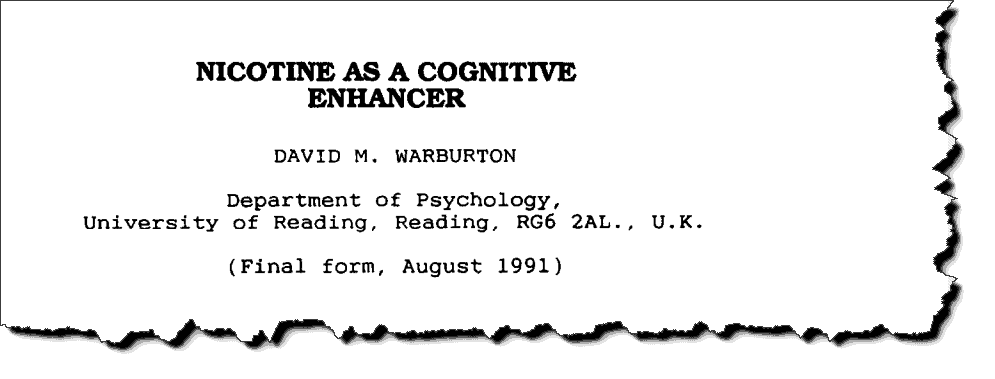
The behavioral psychopharmacologist David Warburton here describes a summary of the most pertinent pre-1991 data on nicotine and cognition.
This has been studied more than you might think, and nicotine is actually the classic agonist of one of the two types of acetylcholine receptors.
‘The cholinergic system has long been considered to have a modulatory role in information processing, attention and memory.’ ―Warburton
Nicotine is actually THE definitive ligand of that receptor.
The muscarinic acetylcholine receptors had been named after muscarine, a mushroom alkaloid, while the nicotinic acetylcholine receptors have been named after you know what.
Nicotine has been shown to bind these receptors strong enough to attribute terminology, and to also to upregulate their expression in the brain.
Nicotine does not significantly affect the expression of muscarinic acetylcholine receptors — a relatively inconsequential type — only the nicotinic ones.
A few molecular characteristics of Alzheimer’s disease include…
Reduced levels of vitamin B12, brain folate, thiamine, the enzyme choline acetyltransferase, and the neurotransmitter acetylcholine and its receptors.
Nicotine bypasses acetylcholine completely by acting as its proxy, a mimetic, and even increases receptor density in the process.
‘While muscarinic receptor numbers and function remain stable over the course of the disease [Alzheimer’s], it is said that there is a significant loss of nicotinic receptors in all cortical laminae.’ ―Warburton
The author of this study was personally involved in much of the research he cites, and being somewhat of a specialist in this area he keeps abreast of all relevant studies.
He has a doctorate in psychology, a position at Reading University, and appears to give a fair summary of all available data.
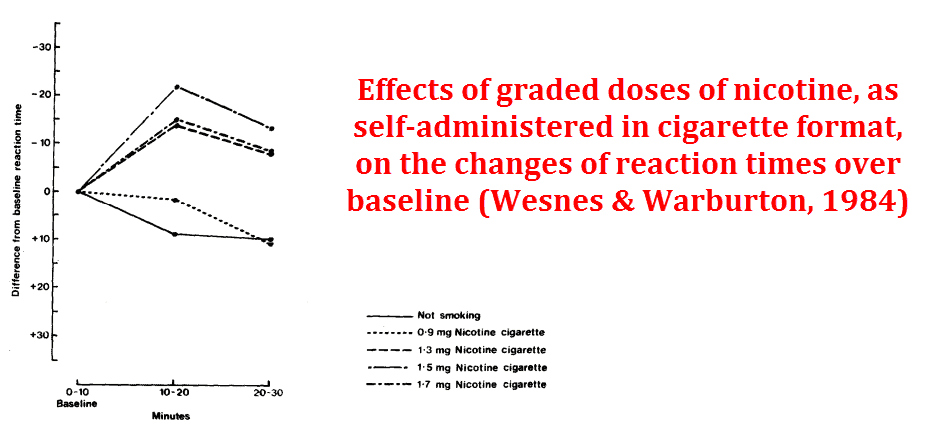
And just in case you think Wesnes & Warburton are surreptitiously-employed agents of the tobacco industry, there are many other articles by different authors with similar conclusions.
Below is just one of them, but there are many more to choose from:
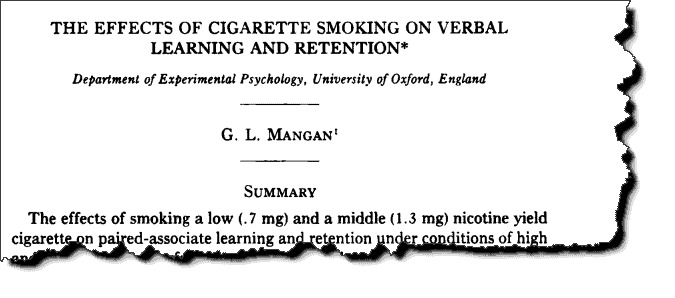
Even more authoritative than the University of Reading is the University of Oxford. Founded in 1096, it’s the oldest in Europe.
They found, using sets of paired words, that smoking cigarettes containing either 0.7 or 1.3 milligrams nicotine facilitated word recall.
‘Smoking a 1.3 or .7-mg-nicotine-yield cigarette prior to acquisition trials thus appears to improve retention significantly, irrespective of the degree of intralist interference.’ ―Mangan
Nicotine’s now-established ability to improve memory is most commonly explained by first increasing attention, a prerequisite for storing and solidifying memory traces.
And studies conducted by Californian scientists show the same positive effects on long-term memory (Peeke, 1984), and also the U-shaped dose/response curve implied by other research.
It’s almost as if too much nicotine taken at once, over about 2mg, can lead to a “cholinergic overload.”
This overload causes a reduction in performance compared to the medium dose groups (~1.5 milligrams).
This is why cigarettes are probably the best in this regard, a format that lends towards smaller doses that can be administered more frequently — more convenient than a pipe.
‘With reference to retention, both nicotine levels significantly enhance recall in paired-associate learning, irrespective of task difficulty. The serial learning data suggest that the effect is on long-term, rather than short-term memory.’ ―Mangan
As objective as some of these studies are, more convincing yet are the more rigorous biochemical studies.
Studies of this type remove whatever subjectiveness had remained from the psychological ones, taking humans completely out of the picture by using PET scans:
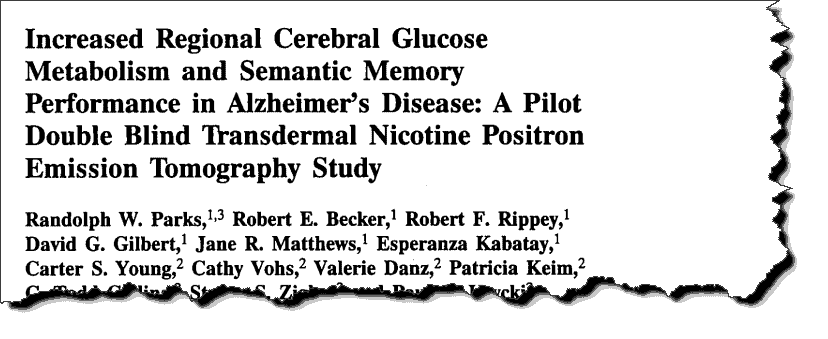
Alzheimer’s disease lends itself naturally towards a trial with nicotine due to the very real potential for improvement.
All three treatments currently FDA-approved for treating Alzheimer’s are cholinesterase inhibitors, thereafter raising acetylcholine by preventing its degradation.
This form of dementia is characterized by low cholinergic activity in the forebrain, including:
- A reduced acetylcholine concentration
- Low levels of enzymes that make it, choline acetyltransferase
- A downregulated expression of its receptors, those of the nicotinic subtype
‘Clearly there is an early and varied deficit in cholinergic function in Alzheimer disease.’ ―Parks
So if anything would be expected to work, it would be something like nicotine.
And for this reason they recruited subjects with Alzheimer’s disease, and performed before and after PET scans of their brains.
This technique directly visualizes radiolabeled glucose uptake.
They found an immediate response, even more noticeable in the patients than in the controls (which ostensibly with normal acetylcholine levels.)

Brain glucose metabolism was increased in the two Alzheimer’s subjects by 29% and 48%, while in the matching controls nicotine increased it by 8% and 7%.
This is yet another confirmation of acetylcholine’s involvement in Alzheimer’s disease and also of low cognition in general, and immediately suggests its use in preventing and treating the condition.
Nicotine increased brain glucose every time, in all subjects, and in every brain region looked at:
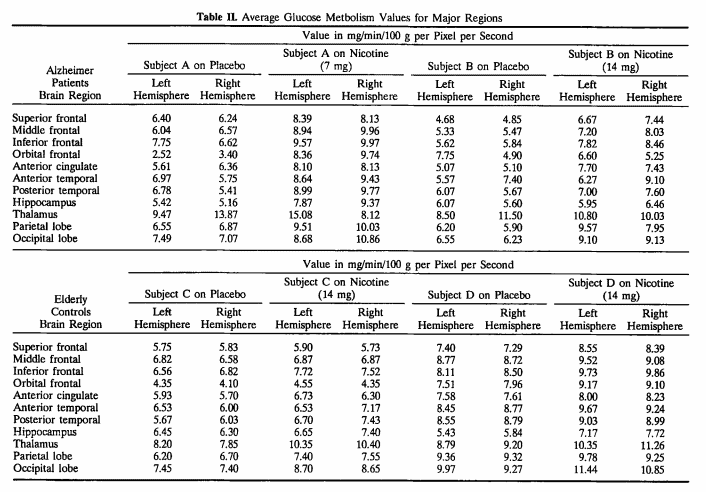
Coincidentally, with the increased brain glucose metabolism was an increased word fluency, as determined by the number of words given beginning with a defined letter.
Subject A had a 10.5% increase in fluency with 7 milligrams of nicotine, and subject B demonstrated a 24.1% increase with 14 milligrams.
‘Table IV shows that all regions were strongly activated by nicotine. Because these are main effect estimates, the interaction between ‘treatment’ and disease condition should not be forgotten. The effect of nicotine was greatest on the AD patients. The ‘treatment’ effect range was from 19% for the anterior temporal lobe to 34% for the orbital frontal.’ ―Parks
Much has been made of other nootropic agents, but coffee and cigarettes together are a very effective combination.
Although more exotic things like piracetam and ginseng demand higher prices, science suggests that we should believe caffeine and nicotine work even better — were it not for them being so commonplace.
Yet should smoking be taboo in your area, or you’re adverse to it, there are many other things to try besides.
These will be topics for other articles, so stay tuned.
‘Consequently, it seems sensible to re-evaluate nicotine as a cognitive enhancer. The ‘treatment’ could be useful in its own right as an enhancer, or as an indicator of the class of ‘treatments’ which may be useful in the future for the amelioration of the cognitive deficits which are characteristic of senile dementia of the Alzheimer type.’ ―Warburton
—-Important Message—-
Did you know that kick-starting your body to burn sugar for energy comes with these advantages?
- Faster, more youthful metabolism — eat and drink virtually anything you want without fear of packing it on as fat
- More energy and stamina — you need less sleep but wake up feeling more rested and refreshed, and no need for afternoon naps
- Perfect blood sugar — when you burn sugar for energy, it keeps the sugars from piling up in your bloodstream and getting too high
- Better erections — men with sugar-burning metabolisms are always getting good, strong erections that last 30 minutes or more
- Potentially add decades to your life — men who burn sugar for energy end up living longer, healthier, sexier lives than men who burn just fat
———-
